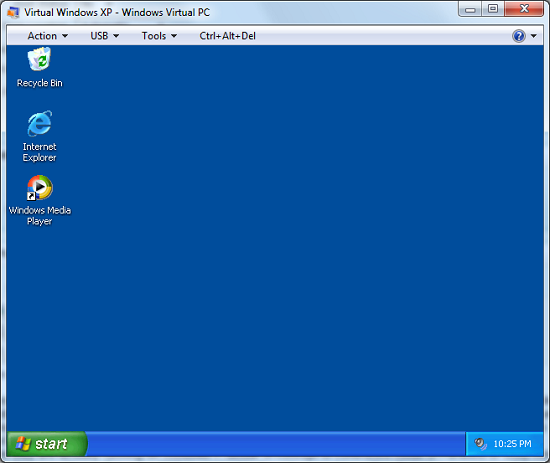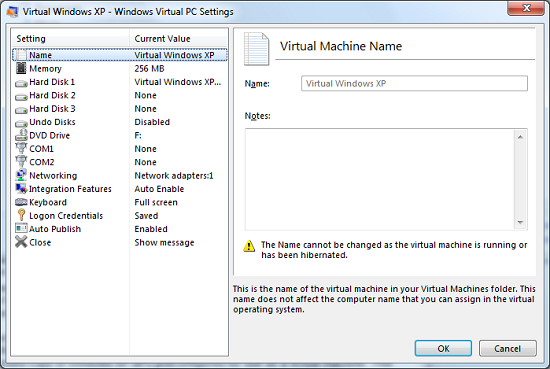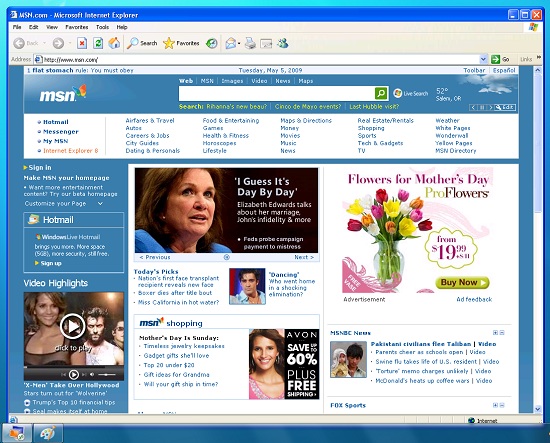Windows 7: Release Candidate 1 Preview
by Ryan Smith and Gary Key on May 5, 2009 11:00 PM EST- Posted in
- Systems
Virtual Windows XP
As we mentioned previously, Microsoft’s big secret unveiled with Windows 7 RC1 is Virtual Windows XP (VXP for short). One of the issues Microsoft has been having in bringing business users over from Win2K and XP to Vista and beyond has been that Windows does not have perfect backwards compatibility. With consumer applications this is not such a big deal since most of those are wide-audience products that get updated regularly, but this is not always the case for business software. Whether it’s some custom in-house application that no one can fix, or a 3rd party application that just works and can’t be updated, business users sometimes can’t escape the fact that they need to be able to run old applications that don’t work in newer operating systems.
VXP is in essence the bone Microsoft is throwing to business users to allow them to run those old applications while using Windows 7. VXP leverages Microsoft’s existing Virtual PC virtualization software that they acquired several years back, by bundling it with a fully licensed copy of Windows XP SP3 preconfigured for use as a virtual machine. This virtual machine can then be partially integrated in Windows 7 so that applications operating inside of it look and behave like they are actually running on Windows XP, similar in concept to the coherence mode of Parallels or Unity mode of VMware. In this case Microsoft is using RDP to connect to the virtual machine rather than screen scraping the entire desktop like Parallels and VMware do. Microsoft does the same thing for the Windows Home Server Console.

VXP Desktop View
As Virtual PC was already free, the significance of this announcement is not the technical details, but rather that Microsoft is endorsing it as an official solution to backwards compatibility problems. It’s long been expected that Microsoft would do something with Virtual PC as a backwards compatibility solution and this is finally it, albeit in a limited role.
Because of the system requirements and issues raised by relying on a virtual machine of XP, VXP is a last-ditch compatibility solution rather than any kind of primary solution. On the system requirement side, VXP requires a processor with hardware virtualization features, along with at least 256MB of RAM and the disk space needed to run the virtual machine. It’s not too bad for a modern system, but it does rule out an older system that may be suitable for upgrading to Windows 7, but not running VXP on top of that.

VXP Configuration
As for the issues raised by using VXP, first and foremost it’s a complete copy of WinXP, with all of its security deficiencies and bugs. It needs security software, it needs administration, and it needs security updates. This also brings up a matter that Microsoft hasn’t answered yet: what happens when WinXP support ends in 2014? Windows 7 will have support until at least 2020, which means either Microsoft is going to drop support for this component of Windows 7 early (an unprecedented move) or they have to extend XP support to match Windows 7’s support cycle. We’re still trying to get a final answer on this.
It should also be noted that VXP only comes with Professional edition and higher, as it’s not intended to be a consumer compatibility solution. And before anyone gets any ideas, it’s not suitable for playing games – the graphics hardware is the usual emulated S3 Trio 64, and the screen does not refresh nearly fast enough to keep up with any kind of action game. Solitaire may be playable, however.

VXP in integrated mode running IE6
At any rate, Virtual Windows XP is a good solution to some compatibility needs, so long as it’s recognized that it’s not the solution to all compatibility needs. For the handful of business users it’s designed for, we would expect that it does its intended job well. However for non-business users that absolutely must have a virtual machine (and won’t need support from Microsoft), it may be worthwhile to look into a free solution like VirtualBox.
Looking towards the future, there has been a lot of speculation that Microsoft may try to make a big break from the Windows APIs in order to clear out all the cruft and deprecated functions that litter their APIs. This isn’t happening today with Windows 7 and VXP, but integrating a virtual machine is the first stepping stone in making it happen. What Microsoft does after VXP is undoubtedly going to be a matter of great interest.










121 Comments
View All Comments
thebeastie - Wednesday, May 6, 2009 - link
I guess what would be the most naive is to think that Windows 7 is about anything else but money, I mean they could easily improve Vista to have every feature that Windows 7 has, but they wont.MS has handed out whole new versions of DirectX and just about every other type of similar feature that is in Windows 7 so forth via service packs in the past.
Some how come that is not possible these days? Its just about treating us like complete fools.
B3an - Friday, May 8, 2009 - link
...You do know you're talking to yourself thebeastie??Are you really this stupid or is apple paying you to write this?
SkateNY - Wednesday, May 6, 2009 - link
Microsoft is a company in decline. It's top managers, supporters, fanboys, and investors are all in denial about this.Their most recent OS was and remains an abysmal failure. Their attempt at competing in the MP3 market is a disaster, no matter how many people tell us that they love their Zune. Their "loss leader" in game consoles is just that...a leader in losses.
Want proof? Look at the stock price for the past five years...at least five years.
MSFT investors are desperate. They'll say and do anything to make others believe that the company is doing as well now as they were doing before they were adjudicated by the US Department of Justice as violating the Sherman Anti-trust Law in restraint of trade.
They've lost a great deal of their investments over the past ten years. They're so desperate that they need to tell themselves -- and anyone who will listen -- that this is a great company.
Sorry, but as is true in the rest of the real world, what has Microsoft done for anyone invested in them lately? The soft answer would be "nothing." The truth is that they've damaged their investors through bad judgment, poor management, and malfeasance.
What they've done is move a great deal of their previously loyal customers to Apple and Linux. And a large percentage of them who haven't made that move are looking into it.
It's a sad story. With so many resources, the best they could do was barely maintain their core products...Windows and Office. Not enough. The rest of the tech world is passing them by, and they don't seem to have a clue.
piroroadkill - Thursday, May 7, 2009 - link
Huh?Microsoft aren't going anywhere.
SimpleLance - Wednesday, May 6, 2009 - link
"It's a sad story. With so many resources, the best they could do was barely maintain their core products...Windows and Office. Not enough. The rest of the tech world is passing them by, and they don't seem to have a clue."Who in the tech world is passing them by? Linux? There is nothing in the Linux world that is an innovation. Everything is a just a bad copying of what they see in Windows. Same goes for OSX. Name a technology from Linux or OSX, and you will find that in Windows years ago.
In the mean time, there is a lot of Windows features that neither OSX or Linux has.
BitLocker drive encryption - OSX only has folder encryption. Windows has had that since Windows NT 3.x.
Active Directory - now being copied by Linux
Access Control List - only recently added in OSX. Has been in Windows NT 1.0.
Remote Desktop - no equivalent at all in Linux or OSX. All they have is VNC. VNC started in the Windows world that got implemented in Linux and OSX. That is the worst form of remote desktop (screen scraping). Its like a high school student's home work. With Remote Desktop, Windows users threw away VNC as trash, and Linux/OSX picked it up - they really have nothing else, but junk.
SMB - copied as Samba. Where is AppleTalk now? Apple does not know how to write an OS. They had to take BSD.
DirectX - makes Open GL like a kid's work.
Etc. etc.
Who again is overtaking who?
New in Win7...
BITS Branch Cache (Vista had something called Peer Cache) - serverless P2P.
Support for TRIM command for SSD - now perhaps being added to Linux. Another me too effort. Definitely not in OSX.
Improved (less chatty) SMB - Samba is behind again. Nobody in the Linux world could make a better SMB. MS had to do it.
VHD Booting - Linux folks probably scratching their head now. What is that? they say. How do we copy that?
Plus all the other eye candy that people talk about.
Hgr - Friday, May 29, 2009 - link
"In the mean time, there is a lot of Windows features that neither OSX or Linux has."I am sure of that, but of those you are listing here, many simply do not apply.
"BitLocker drive encryption - OSX only has folder encryption. Windows has had that since Windows NT 3.x."
BitLocker is a trademark of Microsoft, so it will be difficult to find it in non-Microsoft operating systems. If you're looking for drive encryption in Linux, distributions have been supporting this for years.
"Active Directory - now being copied by Linux"
Yes, the Samba folks are quite active in reimplementing AD in Samba 4 - as a means of Windows interoperability. Note that DNS, LDAP and Kerberos, the three most important of the protocols that AD is built upon, have been copied by Microsoft from Unix systems. They have been available for Linux de facto from their inception.
"Remote Desktop - no equivalent at all in Linux or OSX. All they have is VNC. VNC started in the Windows world that got implemented in Linux and OSX. That is the worst form of remote desktop (screen scraping). Its like a high school student's home work. With Remote Desktop, Windows users threw away VNC as trash, and Linux/OSX picked it up - they really have nothing else, but junk."
Just because you don't know better solutions does not mean that there are none. VNC certainly isn't a native Linux remote desktop protocol, much less a universal tool for everyday work (it has not been designed to be one). For years, X11 SSH tunnelling has been available. For those who want a low-latency remote desktop, the NX compression protocol and software suite have been available for quite some time, and many are perfectly happy with it. Linux's NX can compress even Windows RDP even further. ;-)
"DirectX - makes Open GL like a kid's work."
Just because DirectX is good for making games does not make OpenGL "a kid's work". After all, DirectX is more akin to SDL than to OpenGL. OpenGL has clearly a different target audience - it is used to build industrial software. Is it surprising that it's different?
"SMB - copied as Samba. Where is AppleTalk now? Apple does not know how to write an OS. They had to take BSD."
Actually, SMB was not invented "at Microsoft". It is an intellectual child of three companies - IBM, Microsoft, and 3com. Many operating systems have later adopted this protocol. Surprising, again? We want to be able to talk to other systems so we adopt it. In Linux, you can use at least half a dozen networked file systems.
"Improved (less chatty) SMB - Samba is behind again. Nobody in the Linux world could make a better SMB. MS had to do it."
Why hasn't it been less chatty before? :-) Well, of course, Samba is behind, Microsoft is in charge of updating their broken protocols, the Samba team is not going to do this for them. A Linux user simply uses a less chatty (less broken?) protocol.
"Support for TRIM command for SSD - now perhaps being added to Linux. Another me too effort. Definitely not in OSX. "
Linux kernel and its file system modules have been ready for this since half a year ago, according to one of the leading Linux file system developers. And it is no "me too effort", not as long as it is not Microsoft that invented it a started manufacturing the devices. Are you trying to imply that for any hardware feature, there is only one OS allowed to support it without being accused of me-too-ism, and that all other systems that include support later are just copycats? Great, I've mentioned Kerberos. Good to see that MS joined the "I want it too" crowd. :-)
andrihb - Wednesday, May 6, 2009 - link
In your dreams, maybe.strikeback03 - Wednesday, May 6, 2009 - link
Unfortunately, there are plenty of applications that don't run natively in any *nix (Adobe is my problem) so some version of Windows is the only option.coolkev99 - Wednesday, May 6, 2009 - link
I don't buy an OS based on company stock price.C'DaleRider - Wednesday, May 6, 2009 - link
[quote]Look at the stock price for the past five years...at least five years.[/quote]OK...I did....and the stock price 5 years ago was in the $24/share range, as it was 4 years ago, 3 years ago, 2 years ago, last year. In fact, it's been around $24 per share going back almost 10 years ago.....although just after the beginning of 2000 it spiked to $48 per share, but then the dot com bubble burst and every tech stock fell, MS's included. The release of XP did give a bump to roughly $34/share, but again fell back to its "base" of around $24/share.
Sorry, but this is the first fact you are sadly misinformed on.
Then, the investors. Don't think most are crying and desperate at all. MSFT has been paying dividends every quarter, like clockwork. Granted, since Vista's release, it's not been spectacular, but has been fairly consistent.
Consider MSFT's 5 yr. net profit margin, 27.9%, is still well above sector and industry average. The company's low price-to-earnings ratio -- which Oakmark Fund places at less than nine, based on estimates for this year's earnings -- is closer to seven if you exclude the $4 a share in net cash.
Nicely, the stock is also currently sporting a dividend yield of 3%. But one problem is that investors, especially individual investors, put too much focus on growth expectations and too little focus on price.
Here's another tidbit you overlooked in your bashing.....MS had an EPS of $1.87 in '08, its highest EPS pay since '99. And MS's net profit has grown from '04-'08, every year. (FYI...net profits were, from '04-'08: $8.1B, $12.2B, $12.6B, $14B, and $17.6B).
Granted '09 will be "dismal," it's been dismal for everyone. But MS will still show a net profit and is paying nice dividends on its stock.
And as for everyone crying and gnashing teeth about MS, I wonder why Barron's, and every other analyist, puts Microsoft as a strong buy and NOT ONE has MS as a sell of any sort.
And game consoles? MS never planned to turn a profit on each...it IS a loss leader, just like the PS3. The games themselves are the profit center. Always has been like that and probably will always be like that.
So, where's the panic? Where's the problem? MS is still sitting on over $640M in cash reserves.....something a lot of companies can only wish to have.